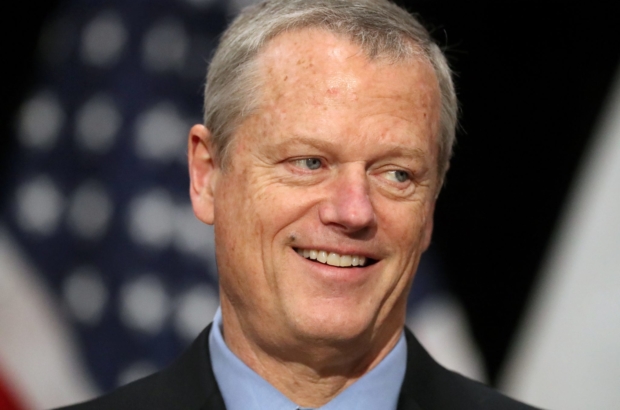The Massachusetts Legislature today passed a sweeping clean energy bill, An Act driving clean energy and offshore wind. The legislation bolsters green transportation, green buildings, and clean power production, including offshore wind, solar, storage and networked geothermal, while creating thousands of new jobs and economic benefits in the process. This bill builds upon the Next Generation Climate Roadmap bill, which was passed earlier this legislative session and overhauled the state's climate laws by putting Massachusetts on a path to reach net-zero limit on greenhouse gas emissions by 2050.
"At the beginning of this legislative session, we codified into law the goal of reaching net zero carbon emissions in Massachusetts by 2050. Today, and as the end of the session nears, the Legislature has again passed historic climate legislation that brings the Commonwealth closer to achieving that ever-important goal," said House Speaker Ronald J. Mariano (D-Quincy). "This legislation will make Massachusetts a national leader in energy generated from offshore wind, while creating thousands of new jobs in the process. I want to thank Chairman Jeff Roy and each member of the conference committee, my colleagues in the House, as well as Senate President Karen Spilka and our partners in the Senate for prioritizing the well-being of our climate, and for working diligently to get this done."
"From searing heat to rising seas, climate change poses a very real threat to Massachusetts residents," said Senate President Karen E. Spilka (D-Ashland). "To leave future generations with a livable planet, Massachusetts must take on the role of a national and international leader in the fight against climate change. Reaching our goal of net-zero carbon emissions by 2050 will require us to take the important steps outlined in this legislation to expand our clean energy capacity, encourage the adoption of electric vehicles, reduce emissions from buildings, and foster high-paying, green jobs for our workforce. I'd like to thank my House partner, Speaker Mariano, Senators Barrett and Creem and all of the conferees for their focus and continued determination to bring this legislation over the finish line, as well as to all of the Senators who played a role in this bill's creation and passage."
"Massachusetts has an opportunity to meet the urgency of the climate crisis through our nation-leading innovation, workforce, and energy resources," said Representative Jeffrey N. Roy (D- Franklin), House Chair of the Joint Committee on Telecommunications, Utilities and Energy. "This timely and comprehensive piece of legislation is carefully calibrated to provide a portfolio of robust clean energy, including offshore wind, and decarbonize our largest-emitting industries, all while attracting a world-class supply chain, intensive workforce training initiatives, and the investment necessary to prepare our electric distribution system for the energy needs of the future."
"The changes we're after make for an unusually long list, because they track the lengthening list of concerns our constituents bring to us," said Senator Michael J. Barrett (D-Lexington), Senate Chair of the Joint Committee on Telecommunications, Utilities and Energy. "The climate problem takes many forms, and with this bill we respond in kind. People worried about the issue will find grounds for hope here."
Offshore wind
To incentivize the development of the offshore wind industry in Massachusetts, this legislation establishes a Massachusetts Offshore Wind Industry Investment Program, administered by the Massachusetts Clean Energy Center (MassCEC), consisting of annual tax incentives, grants, loans, and other investments through the fund, and assistance from MassCEC in accessing other state or federal economic investment programs. It also creates the Massachusetts Offshore Wind Industry Investment Trust Fund, which can be used to promote the manufacture, fabrication, and assembly of domestic supply chain components of the offshore wind industry; stimulate increased financing for permanent manufacturing facilities; advance clean energy research, technology, and innovation, and; prepare individuals for offshore wind careers by supporting workforce training at a range of educational institutions and through regional employment boards.
With the goal of making the Massachusetts offshore wind bidding process more competitive, the legislation modifies the price cap to set clear criteria to allow for offshore wind project proposals that are cost-effective and promote economic development in the Commonwealth. Under this legislation, the price cap will be removed if three or more offshore wind developers submit bids, and if less than three companies bid a modified price cap would remain in place. Preference will be given to bids that invest in local manufacturing, provide employment opportunities for underrepresented populations, and mitigate environmental impacts. Ultimately, a contract would only be approved if deemed cost-effective and beneficial to ratepayers.
The legislation also establishes a commercial fisheries commission to provide input on best practices for avoiding, minimizing, and mitigating impacts to wildlife related to offshore energy generation and transmission.
"I'm proud of the work that Massachusetts has done today, once again ensuring we are at the forefront of the fight against climate change. This legislation prioritizes offshore wind generation, grid preparedness, electric vehicle incentives, and innovation and job development in the clean energy sector," said Representative Tackey Chan (D-Quincy), House Chair of the Joint Committee on Consumer Protection and Professional Licensure. "I want to thank Chair Roy, Minority Leader Jones, and my fellow conferees for working together to move Massachusetts further into the 21st century green economy."
"We began this session by enacting an ambitious law that requires the Commonwealth to reduce emissions 50 percent by 2030 and to achieve net-zero emissions by 2050. Now, less than 18 months later, we have passed another landmark climate bill, a far-reaching piece of legislation that touches multiple sectors—transportation, electricity, buildings, and natural gas—and sets us on a path to reach those emissions-reduction obligations," said Senate Majority Leader Cynthia Creem (D-Newton), chair of the Senate Committee on Global Warming and Climate Change. "Thank you to President Spilka for making climate change a Senate priority, to Senator Barrett and his staff for their tireless work to produce this impressive bill, and to all my fellow conferees for coming together to meet the urgency of the climate crisis."
Solar energy
To support the advancement of solar power, the bill permits agricultural and horticultural land to be used to site solar panels as long as they do not impede the continued use of the land for agricultural or horticultural use, eliminates the so-called 'donut hole' for on-site solar energy net metering to promote residential solar, and loosens the so-called single parcel rule to help expand solar on sites where it already exists.
In addition to wind and solar power, the bill addresses other innovative sources of clean energy such as fusion energy and geothermal power. Acknowledging the harmful health and environmental impacts of utility-scale biomass power plant facilities, this legislation removes biomass from the list of energy-generating sources that are allowed to receive certain state incentives for generating clean electricity. To ensure that the Commonwealth has adequate storage systems to accommodate increasing amounts of clean energy that Massachusetts will be adding to its energy portfolio, this bill directs a study of how to optimize the deployment of long-term energy storage systems.
"The climate bill we have passed today provides a blueprint for reducing greenhouse gas emissions in Massachusetts by making critical investments in the offshore wind industry and offering additional incentives to promote more clean energy jobs and research," said House Minority Leader Bradley H. Jones, Jr. (R-North Reading). "I was honored to serve on the conference committee that negotiated the final compromise language. While this is not a perfect bill, it does move the Commonwealth closer towards meeting its goal of achieving net-zero emissions by 2050."
"This legislation responds to a matter of urgency for our state and our world, and does so by creating the robust infrastructure needed to domesticate the alternative energy production we need here, where it can provide not only the benefits of reducing carbon emissions, but also create jobs and economic opportunity for our ports and our residents," said Senate Minority Leader Bruce Tarr (R- Gloucester). "Passing this bill is important, but we must also not lose the focus we need to source greater supplies of clean energy, store and manage that energy, and deliver it to consumers who depend on it. The bill also takes important steps to ensure that in reaching for the next horizons of alternative energy, we do not jeopardize our irreplaceable commercial fishing industry, which provides food for people here and abroad."
Grid readiness
The legislation also modernizes Massachusetts' electrical grid and energy storage infrastructure. It requires utility companies to proactively upgrade the transmission and distribution grid to improve reliability and resilience and accommodate the anticipated significant shift to renewable forms of energy.
Green transportation
As the transportation sector is the largest source of fuel emissions in Massachusetts, the bill takes steps to encourage the use of electric vehicles, including expanding and codifying the state's MOR-EV electric vehicle incentive program into statute, which provides rebates to individuals who purchase electric vehicles.
Under the bill, the rebate amount will increase by $1,000, to $3,500 for passenger cars and light-duty trucks. Moreover, electric vehicle purchasers who trade in their emission-producing vehicles will be eligible for an additional incentive of $1,000. The program may include a point-of-sale rebate model for individual purchases that offers consumers savings at the point of purchase or lease. The bill also makes used vehicles eligible for rebates. Further, the bill directs the Department of Energy Resources (DOER) to conduct an outreach campaign to promote awareness about the MOR-EV program among consumers and businesses in underserved and low-income communities, as well as in communities with high proportions of high-emission vehicles.
To expand access to electric vehicle charging stations, this bill convenes an interagency coordinating council to develop and implement a charging infrastructure deployment plan in an equitable and comprehensive manner.
The Department of Public Utilities (DPU) would be required to set vehicle electrification and greenhouse gas emission requirements for electric vehicles for transportation network companies. In addition, to ensure that zero-emission vehicle charging remains affordable for consumers, the bill requires all electricity companies to submit proposals to DPU for how they will offer reduced electricity rates for consumers who charge their zero-emission vehicles at off-peak times.
Finally, the bill takes historic steps to address emissions that come from MBTA bus fleets. Starting in 2030, this bill requires every passenger bus that is purchased or leased by the MBTA to be a zero-emission vehicle. By the end of 2040, the MBTA will be required to operate exclusively zero-emission vehicles. Underserved and low-income communities would be prioritized for the equitable deployment of these zero-emission buses.
Building decarbonization
To tackle the difficult issue of emissions from the building sector, the bill creates a 10-municipality demonstration project allowing all-electric building construction by local option. Participating municipalities must receive local approval before applying into the demonstration project. The measure has two important provisos: first, each community must first meet certain affordable housing or multifamily development thresholds; and second, each must exempt life sciences labs and health care facilities from the all-electric requirement.
The bill makes targeted enhancements to the Mass Save program, which provides rebates and incentives for owners and renters related to efficient appliances and other home energy improvements. Under the bill, priority for Mass Save projects will be given to those that maximize net climate, environmental, and equity impacts. Beginning in 2025, Mass Save funds will also be limited in most instances from going to any fossil fuel equipment.
This bill requires DPU to conduct an adjudicatory proceeding prior to approving any company-specific plan under the DPU's future of heat proceedings. In addition, the bill requires DPU to convene a stakeholder working group to develop regulatory and legislative recommendations for how Massachusetts can best align the Commonwealth's gas system enhancement program with the state's 2050 net-zero goal. The working group must submit its final recommendations to the Legislature by July 31, 2023.
Having been passed by the House and Senate, An Act driving clean energy and offshore wind now goes to Governor Baker for his signature.
 |
| Massachusetts Legislature Passes Major Clean Energy Legislation |





